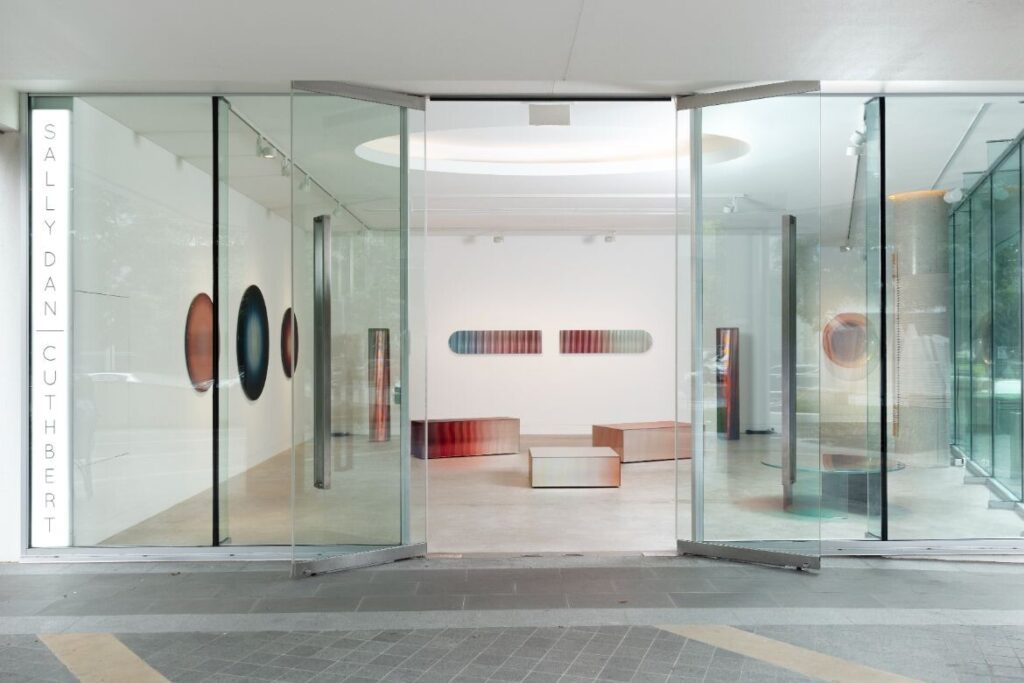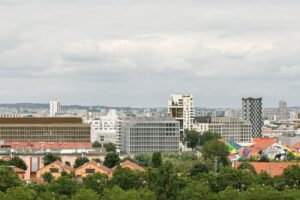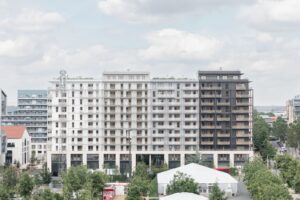At Rive Roshan’s exhibition ‘Internal Reflection,’ everything is energy
Rive Roshan is the creative collaboration between Ruben de la Rive Box and Golnar Roshan, who have recently collaborated with Gallery Sally Dan Cuthbert to present a collection of “purist art forms” that serve a dual function as possible functional art objects. ‘Internal Reflection’ will signify Rive Roshan’s first solo exhibition in Australia and will be showcased until March 17th.
The artists in their Amsterdam-based studio often encounter resistance from one another when brainstorming ideas, but Ruben explains that it is often “the force to push through that resistance [which] creates the momentum for a project.” It is at the point of friction that Rive Roshan decides who has the highest level of passion to spearhead a project while ensuring the other is persuaded of the chosen approach and contributes to building momentum around it.
‘Internal Reflection’ revolves around the power perception has to shift your mentality and how immersive experiences – like art and nature – can alter your perspective towards everyday life. The couple designed the “pieces [to] train your mind to look differently and shift your mindset.”
The exhibition is distinguishable as a “workshop for the mind and focuses on how thoughts and emotions create your decisions,” says Ruben. “In modern society, you need to practice and learn how to get to a place of rest and reflection, and, for us, art is one of the best ways to learn not to worry and open your mind to an idea someone else poses to you.”
‘Internal Reflection’ challenges the stigma that art must be removed from human interaction and solely have an intangible effect on its audience. The exhibition is characterised by human connection and comprises a series of artworks that play with the notion of light and human connection while designing sculptures that can be used for a functional purpose: the Radiance Panels, the Radiance Bench, the Colour Shift Floor Lights and the Colour Dial Round Table.
Originally designed for the Gallery Sally Dan Cuthbert to be displayed at the Melbourne Design Fair, the Radiance Panels are designed to move with you. The design emits a lenticular effect that is portrayed through the material use of textured glass and the illusion of reflection. Rive Roshan constantly experimented with material and colour palettes to create a dimensional effect and give the appearance of movement. The Spectrum Shift Pane represents the first time the couple experimented with thicker textured glass to create more of an animated effect. The space between the panels is also recognised as part of the object, symbolising anticipation and highlighting that the effect of art extends beyond the object itself.
Morphing the idea of the radiance panels and designing dimensional and interactive objects, Golnar defines the Radiance Benches and Tables as “purist art forms.” Although the art objects have a dual, there is a fragility to their appearance, irrespective of the internal timbre substrate designed to sustain weight during its function. The sculptures reflect the colour and luminosity of the base but not the details in the flooring. Describing the artworks as “agnostic,” Ruben highlights how ‘Internal Reflection’ challenges familiarity and visually disorients their surroundings.
Made specifically for Gallery Sally Dan Cuthbert, the artists’ copy of the Colour Dial Table was sold to the NGV for the last Triennial, where it was notably positioned strikingly alongside a Monet and a Pissarro. The table projects the idea of the passing of time through the way the light enters the piece and how the reflection against the floor shifts throughout the day and deepens the projection.
The surrounding environment and physical location “strongly influence” Rive Roshan’s design decisions. Their artworks, in turn, embody a strong connection to nature and seek to emulate the calmness, solitude and subtle movement experienced within natural settings. The artists focus heavily on how their artworks live in an environment, contemplating their impact on those interacting with it and the overall experiential aspect it engenders.
Rive Roshan’s artworks embody a variation of ideas. Each design concept is sparked through a conversation between the artists, which leads to experimentation and the design of multiple iterations. Rive Roshan develops their artworks, drawing upon past iterations as a foundation for reflection and growth. This process allows their ideas to evolve constantly, culminating in their final designs.
Ruben explains that an “iteration of [an] idea needs to live for a little bit to understand if it is successful.” He continues: “As an artist, you need time to consider and understand what you have made; you need time to process why it makes sense and why it is relevant.”
What lies ahead for Rive Roshan? The artists are eager to explore the intricacies of light across various scales and push the boundaries of creating designs with enhanced performative qualities. Referring to their current portfolio as precedent, Rive Roshan will continue experimenting with connection, turning everything into energy.
The post At Rive Roshan’s exhibition ‘Internal Reflection,’ everything is energy appeared first on Habitusliving.com.

Rive Roshan is the creative collaboration between Ruben de la Rive Box and Golnar Roshan, who have recently collaborated with Gallery Sally Dan Cuthbert to present a collection of “purist art forms” that serve a dual function as possible functional art objects. ‘Internal Reflection’ will signify Rive Roshan’s first solo exhibition in Australia and will be showcased until March 17th.
The artists in their Amsterdam-based studio often encounter resistance from one another when brainstorming ideas, but Ruben explains that it is often “the force to push through that resistance [which] creates the momentum for a project.” It is at the point of friction that Rive Roshan decides who has the highest level of passion to spearhead a project while ensuring the other is persuaded of the chosen approach and contributes to building momentum around it.
‘Internal Reflection’ revolves around the power perception has to shift your mentality and how immersive experiences – like art and nature – can alter your perspective towards everyday life. The couple designed the “pieces [to] train your mind to look differently and shift your mindset.”
The exhibition is distinguishable as a “workshop for the mind and focuses on how thoughts and emotions create your decisions,” says Ruben. “In modern society, you need to practice and learn how to get to a place of rest and reflection, and, for us, art is one of the best ways to learn not to worry and open your mind to an idea someone else poses to you.”
‘Internal Reflection’ challenges the stigma that art must be removed from human interaction and solely have an intangible effect on its audience. The exhibition is characterised by human connection and comprises a series of artworks that play with the notion of light and human connection while designing sculptures that can be used for a functional purpose: the Radiance Panels, the Radiance Bench, the Colour Shift Floor Lights and the Colour Dial Round Table.
Originally designed for the Gallery Sally Dan Cuthbert to be displayed at the Melbourne Design Fair, the Radiance Panels are designed to move with you. The design emits a lenticular effect that is portrayed through the material use of textured glass and the illusion of reflection. Rive Roshan constantly experimented with material and colour palettes to create a dimensional effect and give the appearance of movement. The Spectrum Shift Pane represents the first time the couple experimented with thicker textured glass to create more of an animated effect. The space between the panels is also recognised as part of the object, symbolising anticipation and highlighting that the effect of art extends beyond the object itself.
Morphing the idea of the radiance panels and designing dimensional and interactive objects, Golnar defines the Radiance Benches and Tables as “purist art forms.” Although the art objects have a dual, there is a fragility to their appearance, irrespective of the internal timbre substrate designed to sustain weight during its function. The sculptures reflect the colour and luminosity of the base but not the details in the flooring. Describing the artworks as “agnostic,” Ruben highlights how ‘Internal Reflection’ challenges familiarity and visually disorients their surroundings.
Made specifically for Gallery Sally Dan Cuthbert, the artists’ copy of the Colour Dial Table was sold to the NGV for the last Triennial, where it was notably positioned strikingly alongside a Monet and a Pissarro. The table projects the idea of the passing of time through the way the light enters the piece and how the reflection against the floor shifts throughout the day and deepens the projection.
The surrounding environment and physical location “strongly influence” Rive Roshan’s design decisions. Their artworks, in turn, embody a strong connection to nature and seek to emulate the calmness, solitude and subtle movement experienced within natural settings. The artists focus heavily on how their artworks live in an environment, contemplating their impact on those interacting with it and the overall experiential aspect it engenders.
Rive Roshan’s artworks embody a variation of ideas. Each design concept is sparked through a conversation between the artists, which leads to experimentation and the design of multiple iterations. Rive Roshan develops their artworks, drawing upon past iterations as a foundation for reflection and growth. This process allows their ideas to evolve constantly, culminating in their final designs.
Ruben explains that an “iteration of [an] idea needs to live for a little bit to understand if it is successful.” He continues: “As an artist, you need time to consider and understand what you have made; you need time to process why it makes sense and why it is relevant.”
What lies ahead for Rive Roshan? The artists are eager to explore the intricacies of light across various scales and push the boundaries of creating designs with enhanced performative qualities. Referring to their current portfolio as precedent, Rive Roshan will continue experimenting with connection, turning everything into energy.
The post At Rive Roshan’s exhibition ‘Internal Reflection,’ everything is energy appeared first on Habitusliving.com.





